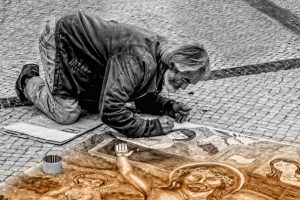I have been asked more than once ‘How should we read the Gospel so that it reaches not only our mind but our heart, and that it should not always stand before the eyes of our mind as an accusation, in which every act and word of Christ, every commandment condemns us; because we are not the kind of people who will act like Him, think and feel as He does, or who can accomplish what He commands’. Out of fear, out of discouragement, we can achieve nothing; we must read the Gospel as though the Lord Jesus Christ comes to us as our closest friend, as someone who cares for us more than anyone else, who not only vaguely wishes for our good, but who is prepared to do all for us — and I say all — that is possible, not only humanly, but as God.
Humanly, we know that Christ gave His life and His death for us, and divinely, that He opens to us the gates of eternity: ‘I am the door, who¬ever enters through Me will also enter into life eternal’.
The first thing we must do when we approach the Gospel is to take it with reverence, with the sense that we are not only handling a book, not only going to read the words, but that this book, and the words which we read are THE Word, God speaking, speaking through human words; and it is important that it should be through human words, because we cannot enter into the mysterious mind of God. Did He not say through Isaiah the Prophet ‘My thoughts are above your thoughts, and my ways above your ways’? But in Christ, it is in human words that He addresses us.
And then we must listen to what He says and look into what He does, look in to all the situations which are depicted in one or another passage of the Gospel with reverence, with interest, with devotional awe, because it is He Who speaks to us; it is Him we see moving, acting, saving. And we must try to find our place in the crowd that surrounds Him, listen as though we were present when He actually spoke, listen as though we stood in the crowd while He was healing, saving, calling to repentance the people who came to Him, and listening as though the words He spoke, as Saint Peter puts it in the Gospel, were words of life — not words of death; words capable of awakening in us all that is alive, both humanly and eternally, divinely; words of life and not the words of death, in the sense that His words are meant to bring us to life, not condemn us even before our death.
This is a very important thing because out of fear, out of the sense of condemnation we will never achieve anything. And so, let us read the Gospel, looking for all those passages which reach us — not those which pass us by; passages which, to use the words of the pilgrims to Emmaus, make our hearts burn within us while He speaks to us. Read those passages which, having set our heart afire, can also bring — or do also bring life to our mind, move our will, stir us up for a new life.
Remember, or realise for the first time, that those passages show us that God and we at that point — it may be a very minute one — are of one mind, of one heart, that we have touched upon a point at which we are already, however germinally the likes of God. It is a revelation of God to us, to discover that He is like us and we — like Him; it is a revelation also of ourselves: at this point, God and I are akin, we are alike; it is already a glimpse we have of the Divine Image within us, and having discovered this we can add: Let me be faithful to that, because by being faithful to that, I will also be faithful to myself and faithful to God.
If we keep as a treasure, as a holy treasure, these glimpses which we have of our most wonderful divine self and the wonderful human self of God — then we can move on with joy, with inspiration; we can move on trying to become what we truly are. Of course, on this journey, we will feel that we have inner resistances, that we do not always want to be the best that we can be: and to that, other passages of the Gospel will respond, saying to us, ‘Beware, beware — if you accept this temptation or another, if you follow this course of life or thought, you are ruining yourself, because the commandments of Christ are not orders that He gives us but a description of what we should feel, wish and be, if we truly became human, worthy of our human nature and our human vocation which is to become the likes of Christ and partakers of His Divine Nature.’
And if we do this, if we begin looking for everything that is beauty in us, already the image of God in us, revealing itself, like the sun shine dawns in the morning; it may not yet be bright midday, but it is always light, beyond the horizon perhaps — but it is light! — then we will get inspiration, and courage to face also the twilight and darkness in us; but creatively, in order to build and not in order to destroy. One does not destroy evil — one builds the good, in the same way in which one does not dispel darkness otherwise than by letting in the light.
So let us try, in the future, to read the Gospel, listen to it with reverence, with joy: God has come to me, He is speaking to me personally; He is revealing to me the beauty there is in me, and also warns me of what can kill this beauty: but He is on my side, He is my friend, my brother in humanity, and also my God and my Saviour. Amen.




















